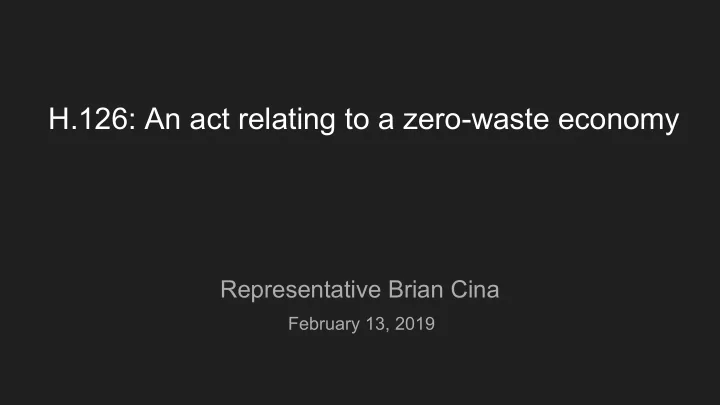

H.126: An act relating to a zero-waste economy Representative Brian Cina February 13, 2019
What is Zero Waste? “Oakland's 2020 Zero Waste Goal is to cut the City's waste disposal by 90 percent (compared to 2005). Oakland's pursuit of a Zero Waste Goal will be guided by an environmental hierarchy for 'highest and best use" of materials and pollution prevention in all phases of production, use, and disposition of products and materials. Zero Waste goes beyond recycling discarded materials. It considers the vast flow of resources and waste through our society and economy, and moves to eliminate waste.” -Oakland, California https://www.epa.gov/transforming-waste-tool/how-communities-have-defined-zero-waste
What is Zero Waste? “Zero Waste is a goal to re-design resource lifecycles so that materials are reused and waste is minimal. Discarded materials become resources that are recycled back into nature or to the marketplace to be reused again.” -Asheville, North Carolina https://www.epa.gov/transforming-waste-tool/how-communities-have-defined-zero-waste
What is Zero Waste? “Though there are many definitions for Zero Waste, it is simply a "no-waste," sustainable approach to managing the production and life cycle of goods. Such an approach is very much in keeping with the Vermont traditions of thrift and conservation.” -Central Vermont Solid Waste Management District https://www.epa.gov/transforming-waste-tool/how-communities-have-defined-zero-waste
https://www.ontario.ca/page/strategy-waste-free-ontario-building-circular-economy
Zero Waste Communities - Seattle, Washington - King County, Washington - Austin, Texas - Fort Collins, Colorado - Asheville, North Carolina - State of California - State of Connecticut - Guam - Kamikatsu, Tokushima (Japan) - Capannori, Italy - Canada - U.S. Conference of Mayors (2015 Resolution- adopts a definition of Zero Waste, and set of Zero Waste principles, that recognizes a Hierarchy of Material Management) https://www.epa.gov/transforming-waste-tool/how-communities-have-defined-zero-waste
Zero Waste Economy Study Committee The Study Committee shall: - develop and issue a request for proposal (RFP) for a plan as to how Vermont can transition to a zero-waste economy, - select a consultant, - enter into contract with consultant, - oversee the work of the selected consultant in developing a plan that provides recommendations, guidelines, and a timeline regarding transition to a 90-percent zero-waste, circular economy by 2050 in Vermont.
Zero Waste Economy Study The plan’s recommendations and guidelines shall incorporate the following objectives: - Prevent waste, promote sustainable materials management, & minimize reliance on disposal, - Reduce energy consumption, greenhouse gas emissions, & other adverse environmental impacts, - Identify possible economic and other incentives for the colocation of businesses and manufacturers in designated areas to share resources, reduce waste, and allow more productive use of waste and by-products, - Encourage the adoption of biologically inspired production processes and materials, - Use old sites first, before creating new ones, - Restore ecosystems whenever possible, -
Zero Waste Economy Study The plan’s recommendations and guidelines shall incorporate the following objectives: - Minimize the waste of human resources and potential by increasing opportunities for meaningful employment, providing flexible pathways for education, training, and employment, and identifying underutilized segments of the workforce, - Use all available housing stock before building new units, to use land more efficiently while protecting ecosystems, and to prevent waste in housing infrastructure, - Engage stakeholders and the public in processes that empower people on the local level to be involved in the decisions that will shape the future of their region and the State.
Zero Waste Economy Study In developing the plan, the selected bidder shall consider the following issues: - how to move beyond full implementation of Vermont’s universal recycling law, - how to improve the waste management plans for solid waste districts, - how to engage with each major region of the State to identify existing local businesses, community resources, strengths, needs, and challenges - possible incentives to increase productivity of existing operations, - how to identify gaps in local economies that could be strategically filled to create closed-loop manufacturing. - ways to encourage local energy generation and waste containment,
Zero Waste Economy Study In developing the plan, the selected bidder shall consider the following issues: - how to provide food for the entire population year-round by eliminating food waste and promoting the recycling of food, increasing the productivity of existing land, creating indoor growing facilities in every region in the State, and promoting legal and regulatory changes to further these objectives, - whether it is viable to produce local bioreplacements for plastic to sell across the State and beyond, - how to build a sustainable, local energy grid that sells to surrounding regions, - how to capture phosphorus and other wastes from waters for recycling versus on-site management of wastewater, - how to employ the objectives of existing wastewater plans, - strategies for replacing the entire State vehicle fleet with electric vehicles, - how to build a green transportation infrastructure.
Zero Waste Economy Study In developing the plan, the selected bidder shall engage with relevant stakeholders, including: - Solid waste districts, - The Department of Environmental Conservation, - The Vermont Chamber of Commerce, - Regional planning commissions, - Environmental advocacy groups. On or before January 15, 2020, the selected bidder shall provide the Study Committee with a written report setting forth findings and any recommendations for legislative action.
Benefits of a Zero Waste Economy Plan - Improve water quality - Reduce carbon emissions and other air pollutants - Minimize toxics in the environment - Decrease solid waste pollution - Increase energy efficiency - Encourage recovery of ecosystems - Attract businesses - Create jobs - Revitalize towns across Vermont
Benefits of a Zero Waste Economy Plan - Meet statutory goal of “reducing emissions of greenhouse gases” by 75% by 2050 (10 V.S.A. § 578) - Address the Universal Recycling Law (Act 148 of 2012) - Clean up Vermont’s waterways as required by federal and state law
Recommend
More recommend